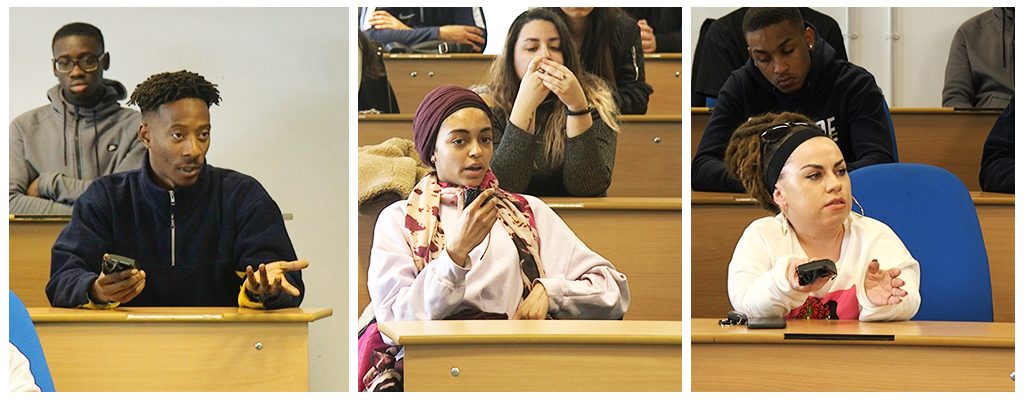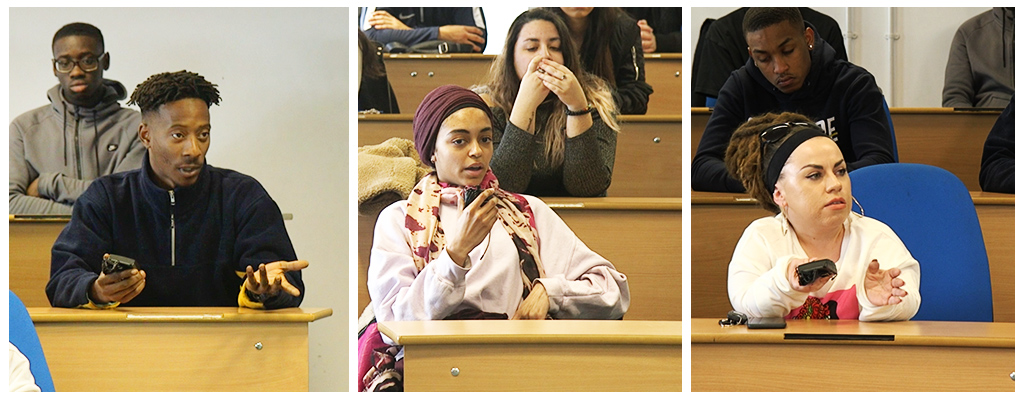
Pressure from social media and popular culture can lead to mental health issues
Sexualisation and other pressures from social media, music and popular culture are leading to mental health and other problems, especially among young girls, according to the findings of a project by 12 University of East London journalism students.
The female students who took part have now recorded their conclusions on film in a unique community engagement project which uncovered a number of underlying issues.
The students’ series of films and interviews on sexualisation covered subjects such as Victoria’s Secret models and their image, the make-up and beauty industry, and different perceptions of male and female virginity.
Over two terms in 2018/2019, the Level 5 journalism students from the University collaborated with arts and media charity Samosa Media to investigate the effects of sexualisation within the media on young women, in particular. They have now created a website which will be used by Samosa as an educational resource in its work with secondary schools. Rishabh Shrivastav, a PhD Student at the University of East London, worked with Samosa Media to support the student group throughout the film-making process.
The films concluded that ‘while the corporations behind this content rake in the cash, the Establishment is doing nothing to help’.
The film series examines concerns around images the models present to young girls, as well as health issues around the diets they follow, look at issues around make-up and explores empowerment and the music industry, plus women’s roles within it.
Samosa connects film, spoken word and multi-media artists with young people and uses film, theatre and journalism to provide creative spaces for young people to explore cultural and social issues. The organisation works to embed diversity in the arts and humanities curriculum and has collaborated with The Sir John Cass’s Foundation, The Esmee Fairbairn Foundation, The John Lyon’s Foundation and Sir Harvey McGrath in its productions.
Simon Patrick Miles, senior lecturer and programme leader of the Journalism course, said, “This is our third collaboration with Samosa Media and I think in some ways this is our most ambitious and challenging piece of work so far with our journalism students, as it is a community engagement project that touches on very topical issues and concerns.”
Mr Miles explained that the work came through a series of sessions with Samosa Media who led a range of study group discussions on journalism, history, race and politics with the students. “The students were tasked with producing four short films of their own and themselves chose sexualisation and other pressures as the theme for their work. I am very proud of the films they have produced and the dedication and effort they have put into this unusual project.”
Anwar Akhtar, chief executive officer of Samosa Media, said, “This project has been unique in terms of a group of young female students taking this kind of study and participatory media approach to this sensitive subject. I think the students gained a great deal both academically and in learning about professional media practice.
“The present project is part of a wider programme of work that aims to diversify the curriculum and to broaden the learning experience of all students, but with an additional focus on those from black and ethnic minority (BAME) backgrounds. Each project has generated resources that will help teachers and youth and community workers developing their curricula. Through its work with the University of East London, Samosa Media has helped working-class and often BAME university students to gain confidence in communication and critical thinking, and to gather knowledge about social issues that affect them.”
The students worked over two terms on the project and the work is currently being curated and scaled up for online distribution across schools, colleges and universities in the UK as curriculum resources for other students. The films will appear on Samosa’s website as part of the charity’s media and diversity education programme resources for schools, colleges and universities. The films will also be screened on campuses as part of the curriculum programme between the University of East London and Samosa Media.
“It will help students from all backgrounds engage with the arts and humanities in a way that helps foster integration and understanding,” Mr Akhtar added.
Past collaborative projects between Samosa and the University of East London have included the topic of Brexit and a groundbreaking documentary examining the hazards inherent in the government’s anti-radicalisation strategy and can be viewed here. For information on this project contact Samosa media on info@thesamosa.org.uk.
The student’s body of film work and study notes can all be viewed on the project website: www.uel.ac.uk/news/2019/12/uel-students-produce-film-on-effects-of-sexualisation-and-social-media.
